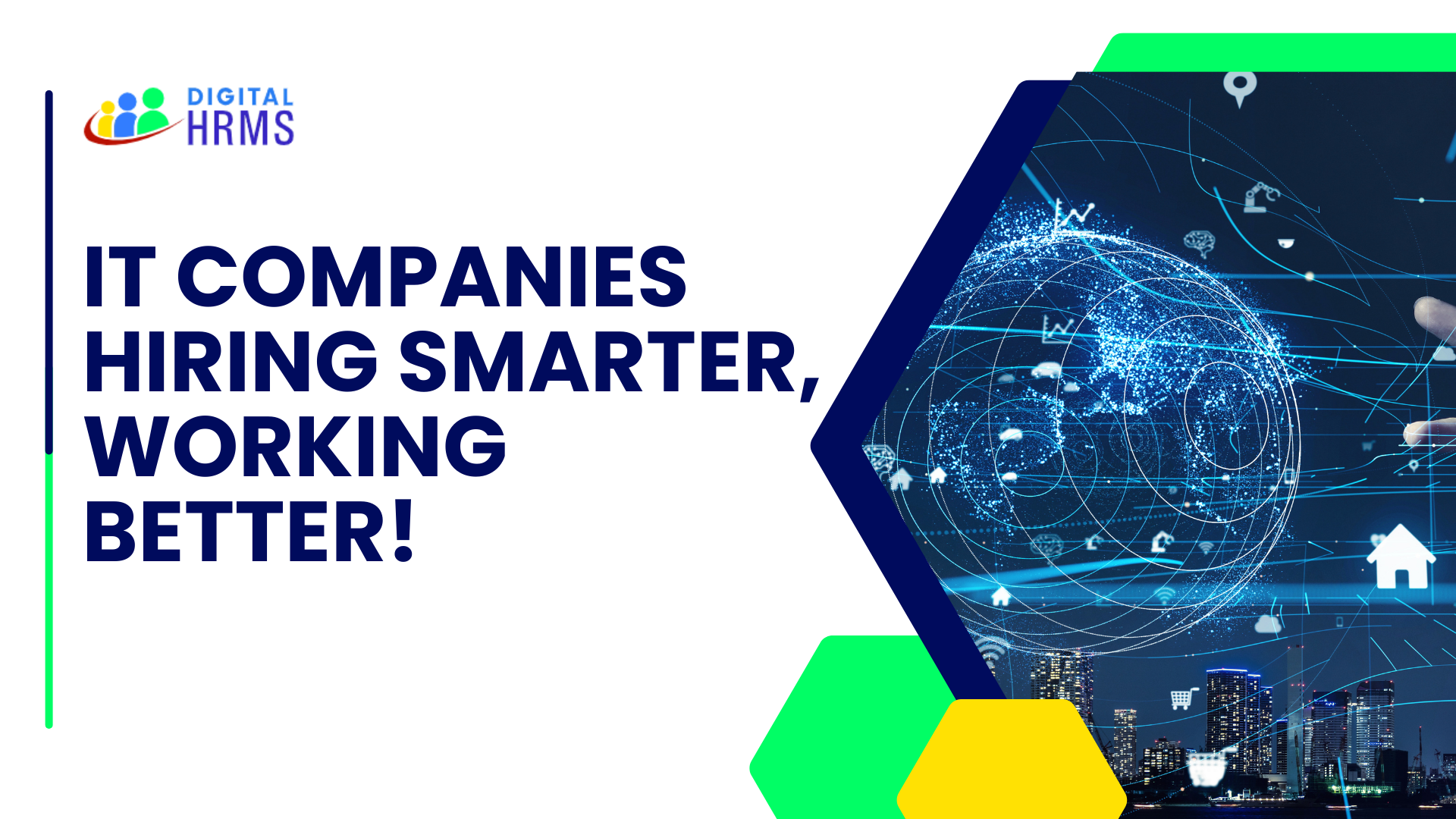Improving Workforce Productivity: The Future Insights of Recruitment Management in IT Services

The New Era of Talent Acquisition in IT
The IT services sector is on the brink of a major transformation, where the productivity of the workforce is increasingly shaped by how effective and agile the recruitment processes are. Talent has evolved beyond being just a resource; it’s now the driving force behind innovation, adaptability, and gaining a competitive edge. As companies strive to attract the best tech talent, having a solid recruitment management system is no longer just a nice-to-have—it’s essential.
The Strategic Importance of Recruitment in IT Services
Evolving Expectations from Tech Talent
The days of candidates sitting back and waiting for job offers are long gone. Today’s tech professionals are looking for meaningful work, quick career advancement, and tech environments that promote ongoing learning. Employers need to adapt, making sure their recruitment processes are responsive, transparent, and tailored to individual needs.
Competitive Advantage through Human Capital
In the realm of IT services, having skilled talent can significantly impact project timelines, client satisfaction, and digital innovation. Effective recruitment goes beyond merely filling positions; it’s about building a strategic advantage by bringing in individuals who can drive real change.

Challenges in Traditional Recruitment Models
Manual Screening and Delays
The old-school hiring process—where resumes are screened manually, communication is disjointed, and approvals take forever—leads to frustrating delays. Positions can stay vacant for weeks, or even worse, get filled by candidates who aren’t quite right for the job.
Misaligned Candidate-Role Fit
Without smart tools, recruiters often find it tough to align the specifics of job descriptions with the right candidate profiles. This mismatch can result in higher turnover rates, a rocky onboarding experience, and a drop in team productivity.
Digital Transformation in Recruitment
The Rise of Recruitment Management Software
The advent of recruitment management software is a game changer in the world of HR technology. These innovative tools bring together, automate, and enhance every step of the hiring process—from job requisition to onboarding—helping to eliminate inefficiencies and boost accuracy.
Introduction to Recruitment Management Tools and Modules
Today’s platforms feature a recruitment management module that fits perfectly into an organization’s larger HRMS ecosystem. These modules give hiring managers access to real-time dashboards, candidate pipelines, automated screening, and collaborative feedback systems.
The Role of HRMS in Streamlining the Recruitment Process
Automation via HRMS Recruitment Features
HRMS recruitment solutions simplify the hiring process by automating repetitive tasks like scheduling interviews, sending status updates, and generating offer letters. The outcome? Fewer mistakes, quicker hiring cycles, and more time for strategic decision-making.
Integrated Resume Parsing Tool for Accurate Profiling
A powerful resume parsing tool serves as the digital brain of recruitment—pulling out relevant data, tagging skills, and filtering candidates based on job-fit algorithms. By working in tandem with the recruitment management tool, it ensures that only the most suitable applications make it to the recruiter’s desk.
Key Features of an Ideal Recruitment Management System
- Flawless Recruitment Gateway
An ideal recruitment gateway shines when it effortlessly attracts, evaluates, and secures talent. For candidates, this translates to a smooth journey from application all the way through to onboarding.
- Workflow Customization and Analytics
Every IT organization has its unique hiring rhythm. A flexible recruitment management system offers the ability to customize workflows—think role-based approvals, automated triggers, and SLA monitoring—tailored to fit internal processes. Plus, real-time analytics provide valuable insights into any bottlenecks, recruiter performance, and the effectiveness of different sourcing strategies.
- AI-Driven Resume Parsing
Forget about futuristic dreams; predictive analytics, sentiment analysis during interviews, and smart recommendations for shortlisting candidates are all part of the package with AI-powered resume parsing tools like DRP. These features empower HR teams to make informed hiring decisions that can significantly enhance team productivity.
Digital HRMS Recruitment Management: A Paradigm Shift
How Digital HRMS Redefined Hiring Practices
Digital HRMS has become a game-changer in IT recruitment, offering a comprehensive recruitment management module that streamlines the entire hiring process. With features like workflow automation, advanced resume parsing, and in-depth analytics, it reduces hiring delays and improves candidate alignment.
Case Examples of Enhanced Productivity and Reduced Time-to-Hire via HRMS
Organizations that have embraced an integrated HRMS recruitment management solution have seen some impressive results:
Take, for instance, a mid-sized tech startup that managed to cut their time-to-hire from 45 days down to just 30 days, which is a remarkable 33% decrease. They achieved this by automating scheduling, simplifying job postings, and leveraging real-time analytics—leading to a 15% boost in project delivery speed within just six months. (reddit.com, blogs.vorecol.com, vorecol.com, psicosmart.pro, blogs.vorecol.com)
On a broader scale, companies using HRMS tools have experienced average reductions in time-to-hire ranging from 25% to 30%. Surveys from LinkedIn and SHRM indicate that these platforms have managed to shorten recruitment cycles from the industry standard of around 36 days to as little as 10 to 30 days, depending on the organization. (blogs.vorecol.com)
At the enterprise level, companies like IBM and Unilever have utilized analytics-rich HRMS platforms to achieve even more significant reductions in time-to-hire, cutting it by approximately 30% to 50%. IBM’s integrated ATS-CRM system reduced their time-to-hire by 30%, while Unilever celebrated a remarkable 50% decrease in time-to-fill.
Future Insights: What Lies Ahead for Recruitment in IT
Predictive Hiring and Talent Forecasting
The recruitment landscape is evolving, and future-ready management systems are set to do more than just fill positions—they’ll actually predict hiring needs. By diving into internal attrition patterns, market demands, and upcoming project pipelines, these innovative tools will help organizations create proactive talent pools.
Ethical AI and Candidate Experience
As AI takes a more prominent role in recruitment, ethical issues like bias reduction, algorithm transparency, and candidate data privacy will become increasingly important. We can expect HRMS platforms to invest in responsible AI solutions that strike a balance between efficiency and fairness.
Building a Resilient, Future-Ready IT Workforce
The path to enhancing workforce productivity starts with transforming how we identify, engage, and onboard talent. By merging smart technology with a human-centered approach—like what platforms such as Digital HRMS offer—we can create a recruitment process that’s not only quicker and smarter but also more compassionate. For IT services looking to stay ahead, adopting these systems isn’t just an option; it’s a strategic necessity.
Transform your recruitment strategy today. Discover how modern recruitment management systems, like Digital HRMS recruitment module with Digital Resume Parser tools and automation, are shaping a faster, smarter, and more productive IT workforce.
Explore the future of hiring in your IT Company—start your journey Request pricing of Digital HRMS now!